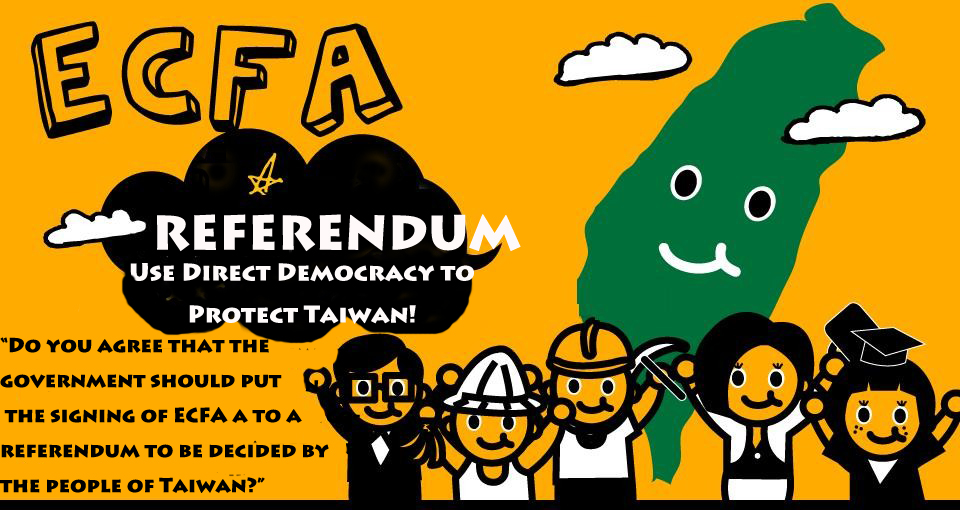Taiwanese remain skeptical about free trade deal with China
Vancouver Sun | May 3, 2010
Taiwanese remain skeptical about free trade deal with China
By Jonathan Manthorpe
Taiwan’s president Ma Yingjeou insists a trade cooperation agreement with China is the only way the island nation can avoid the kind of economic isolation that has driven North Korea into famine and dysfunction.
But the majority of the island’s 23 million people don’t seem to believe him.
Despite a persistent propaganda campaign by Ma’s Kuomintang (KMT) administration, most Taiwanese people appear to continue to worry that any kind of free trade agreement with Beijing will expose domestic industries to the threat of cheap, subsidized Chinese products.
Taiwanese are also unconvinced by Ma’s assertions that a trade deal with China won’t open the door to Beijing’s long-term goal of seizing political control of the island, which it claims, without legal, moral or historical justification, to own.
Ma’s difficulty with this is in part because he argues that Taiwan needs to make free trade agreements with other nations in Asia, where 58 FTAs have been signed since 2000. But because most countries pay some kind of lip service to Beijing’s claim to own Taiwan in order to be able to do business with China, no one will risk that trade by doing an FTA deal with Taipei without a nod from Beijing.
Ma argues that Taiwan’s trade deal with China will thus open the doors to FTAs with other Asian countries. But that implies that Beijing will only drop its blackmail veto on other nations making FTA agreements with Taiwan if it believes its own economic agreement with Taipei is an irreversible step toward gaining political control of the island.
So it is hard for Ma to maintain there is no political context to the trade deal or threat to Taiwan’s sovereignty.
Public concerns and apprehensions about the Economic Cooperation Framework Agreement (ECFA) have been stirred by the secrecy surrounding the talks between Taipei and Beijing, and information about what is likely to be in the final document.
Negotiators Tang Wei, a senior official with China’s commerce ministry, and Huang Chih-peng, director-general of Taiwan’s foreign trade bureau, met first at the end of January and then at the beginning of April.
They plan to meet again in the next few weeks to complete the ECFA for signing in June.
In his latest effort to sell the deal to the Taiwan public, Ma appeared a week ago in a televised debate with the leader of the opposition Democratic Progressive Party (DPP), Tsai Ing-wen.
While there is a consensus that Ma gave a better performance and Tsai was stronger in her criticism of ECFA and its implications, the debate does not appear to have significantly changed the political equation.
Public opinion polls in Taiwan are notorious for reflecting the political position of the organization — usually a media outlet — paying for the survey.
But even the most avid supporters of the administration were unable to massage the results to suggest that Ma had turned the tide and overcome public anxieties about ECFA.
It was not even clear that viewers felt the debate had given them a clear idea of what is involved in ECFA and what the issues are.
Ma was elected in 2008 with public support approaching 70 per cent on a pledge to seek economic cooperation with China, but not to expose Taiwan’s sovereignty or independence to Beijing’s ambitions.
He has already made a number of agreements with Beijing covering tourism from China and direct air and sea links between the two countries.
But since his election, Ma’s popularity has slumped to just over 20 per cent after a series of political pratfalls and public misgivings that there is little substance behind his polished presentation.
Ma needs to be able to show some economic benefits from his dealings with China if he is to retain the KMT leadership and have any hope of being the party’s candidate in the next presidential elections in 2012.
For the moment, Beijing seems willing to accommodate Ma on the basis that he is the best agent available to undermine or override the conviction among a majority of islanders that they are Taiwanese, not Chinese, and — by over 80 per cent — that they want to maintain their independence.
So, from what Ma said in the debate, it seems the ECFA planned for June will only include some tariff reductions and exemptions, investment protection and intellectual property rights protection.
At the moment the tariffs on Taiwanese goods going to China average nine per cent. China is the destination for 40 per cent of Taiwan’s exports and the trade is worth about $100 billion a year.
Beijing appears to have agreed to take some of the most contentious issues off the table in order to help Ma sell the deal.
Restrictions will not be lifted on 834 Chinese agricultural products nor will an influx of lower-paid Chinese workers be allowed. And the qualifications of Chinese professionals won’t be recognized either.
The opposition DPP wants a referendum on the deal, but Ma’s administration will avoid going that route and instead use its majority in the parliament, the Legislative Yuan, to gain ratification.
A test will then be whether Beijing does indeed allow Taiwan’s potential Asian FTA partners such as Singapore, Indonesia, the Philippines, Japan and South Korea, to make trade liberalization agreements without reprisals from China.






